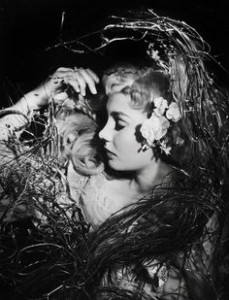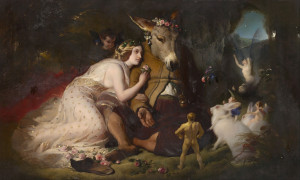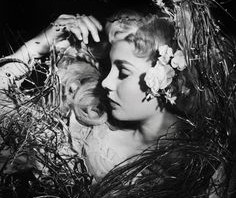Question #2 in the Tea Party Question List:
How does Shakespeare’s drawing on his “fairy tales” (i.e. Hamlet) compare to the modern synthesis of fairytales into popular entertainment?
This is a difficult question to answer, mostly because of how little information we have about local lore in the time of Shakespeare and about his writing process. There are also significant differences in the way fairy tales were passed among audience members in Shakespeare’s time: for example, many of his audience members had incredible numbers of stories and legends memorized, and had a much better ability to listen and understand. This would have allowed them to notice much more quickly subtle allusions to folk tales and fairy tales that were popular at the time. However, bearing those differences and more in mind, and given these informational constraints, it is still possible to draw some striking comparisons between Shakespeare’s use of fairy tales and their use in modern-day television.

I didn’t realize this until I wrote this post, but one example of Shakespeare probably using an existing legend in his writing is Hamlet. There are strong parallels between this story and an Icelandic saga called Vita Amlethi. This is particularly interesting because if it was a saga, that means it was lore passed down through writing, rather than the oral tradition. This may be somewhat similar to what modern-day TV producers do when they adapt literary fairy tales, like Alice in Wonderland and Peter Pan. In this sense, Hamlet provides an example of how playwrights in the 16th century and screen-writers in the 21st both draw on written and oral tradition in order to write stories that both resonate with and challenge their audience’s ideas of culture.
In terms of current scholarship on this issue, I found this article on Shakespeare’s use of fairy tales by Ciara Rawnsley:
http://www.fupress.net/index.php/bsfm-jems/article/view/12632/11829
In this article, Rawnsley claims that Shakespeare uses fairy tale elements in his play All’s Well that Ends Well, but subverts audience expectation by drawing on the darker aspects of these stories. She claims that he does this in order to examine the complex, ambiguous nature of fairy tales and life, and that in so doing he explores issues such as sexuality and power dynamics. While some of her claims about All’s Well that Ends Well might be a little bit of reach, I certainly believe that all fairy tales do have darker elements, and that one of their many functions is to allow us to examine the inherent contradictions in our lives and social norms.

Another example of Shakespeare’s use of fairy tales is a Midsummer Night’s Dream. While I am not sure what specific tales might have inspired the arc of this play, there are clearly a multitude of magical and mythical tropes at work in the narrative: lovers who are blinded by a magical potion, quarreling supernatural forces, the very presence of the fairies, and, I would argue, the playwright’s conscious choice to place the inexplicable, supernatural parts of his narrative in a forest that is separated from the town. This creation of a fairy tale place-world (often a forest), which includes a geographic and mental space where magic and reality can touch, is extremely prevalent in contemporary fairy-tale TV. Both then and now, these magical events in a fairy-tale landscape allowed the audience to bypass their normal distinction between the possible and the impossible and probe deep emotional issues that are hard to conceive let alone vocalize in a normal setting (for example, gender roles and whether or not it is possible for an evil person to become good).
While we cannot know exactly how Shakespeare used fairy tales, it seems that idea of using a familiar cultural text to critique mankind’s understanding of existence has been around much longer than television.
